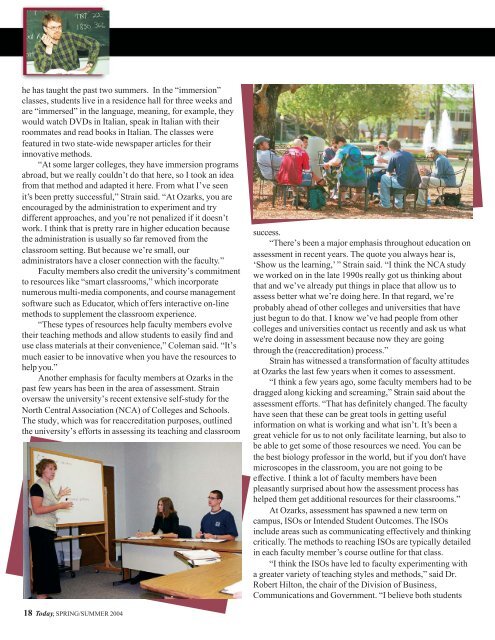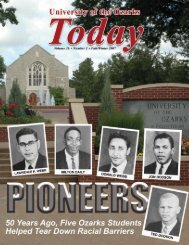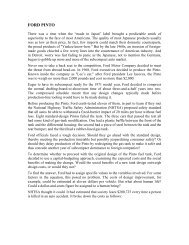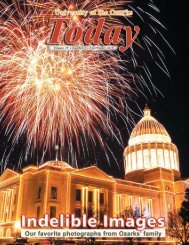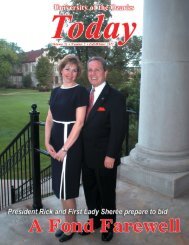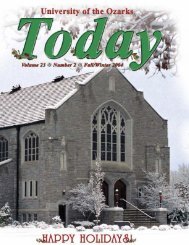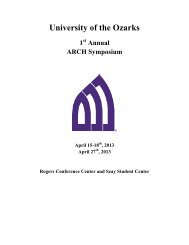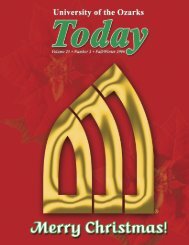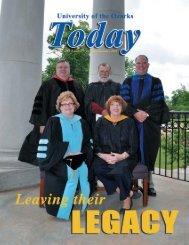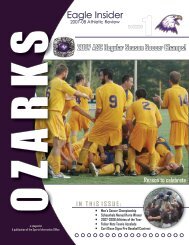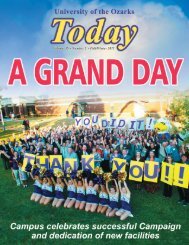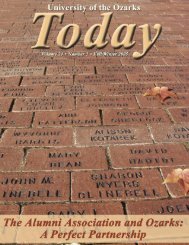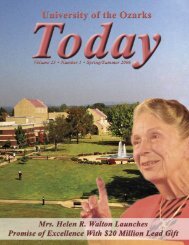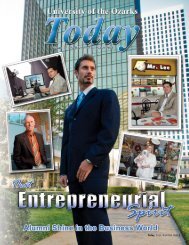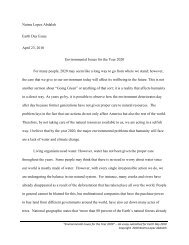he has taught <strong>the</strong> past two summers. In <strong>the</strong> “immersion”classes, students live in a residence hall for three weeks andare “immersed” in <strong>the</strong> language, meaning, for example, <strong>the</strong>ywould watch DVDs in Italian, speak in Italian with <strong>the</strong>irroommates and read books in Italian. The classes werefeatured in two state-wide newspaper articles for <strong>the</strong>irinnovative methods.“At some larger colleges, <strong>the</strong>y have immersion programsabroad, but we really couldn’t do that here, so I took an ideafrom that method and adapted it here. From what I’ve seenit’s been pretty successful,” Strain said. “At Ozarks, you areencouraged by <strong>the</strong> administration to experiment and trydifferent approaches, and you’re not penalized if it doesn’twork. I think that is pretty rare in higher education because<strong>the</strong> administration is usually so far removed from <strong>the</strong>classroom setting. But because we’re small, ouradministrators have a closer connection with <strong>the</strong> faculty.”Faculty members also credit <strong>the</strong> university’s commitmentto resources like “smart classrooms,” which incorporatenumerous multi-media components, and course managements<strong>of</strong>tware such as Educator, which <strong>of</strong>fers interactive on-linemethods to supplement <strong>the</strong> classroom experience.“These types <strong>of</strong> resources help faculty members evolve<strong>the</strong>ir teaching methods and allow students to easily find anduse class materials at <strong>the</strong>ir convenience,” Coleman said. “It’smuch easier to be innovative when you have <strong>the</strong> resources tohelp you.”Ano<strong>the</strong>r emphasis for faculty members at Ozarks in <strong>the</strong>past few years has been in <strong>the</strong> area <strong>of</strong> assessment. Strainoversaw <strong>the</strong> university’s recent extensive self-study for <strong>the</strong>North Central Association (NCA) <strong>of</strong> Colleges and Schools.The study, which was for reaccreditation purposes, outlined<strong>the</strong> university’s efforts in assessing its teaching and classroomsuccess.“There’s been a major emphasis throughout education onassessment in recent years. The quote you always hear is,‘Show us <strong>the</strong> learning,’ ” Strain said. “I think <strong>the</strong> NCA studywe worked on in <strong>the</strong> late 1990s really got us thinking aboutthat and we’ve already put things in place that allow us toassess better what we’re doing here. In that regard, we’reprobably ahead <strong>of</strong> o<strong>the</strong>r colleges and universities that havejust begun to do that. I know we’ve had people from o<strong>the</strong>rcolleges and universities contact us recently and ask us whatwe're doing in assessment because now <strong>the</strong>y are goingthrough <strong>the</strong> (reaccreditation) process.”Strain has witnessed a transformation <strong>of</strong> faculty attitudesat Ozarks <strong>the</strong> last few years when it comes to assessment.“I think a few years ago, some faculty members had to bedragged along kicking and screaming,” Strain said about <strong>the</strong>assessment efforts. “That has definitely changed. The facultyhave seen that <strong>the</strong>se can be great tools in getting usefulinformation on what is working and what isn’t. It’s been agreat vehicle for us to not only facilitate learning, but also tobe able to get some <strong>of</strong> those resources we need. You can be<strong>the</strong> best biology pr<strong>of</strong>essor in <strong>the</strong> world, but if you don't havemicroscopes in <strong>the</strong> classroom, you are not going to beeffective. I think a lot <strong>of</strong> faculty members have beenpleasantly surprised about how <strong>the</strong> assessment process hashelped <strong>the</strong>m get additional resources for <strong>the</strong>ir classrooms.”At Ozarks, assessment has spawned a new term oncampus, ISOs or Intended Student Outcomes. The ISOsinclude areas such as communicating effectively and thinkingcritically. The methods to reaching ISOs are typically detailedin each faculty member’s course outline for that class.“I think <strong>the</strong> ISOs have led to faculty experimenting witha greater variety <strong>of</strong> teaching styles and methods,” said Dr.Robert Hilton, <strong>the</strong> chair <strong>of</strong> <strong>the</strong> Division <strong>of</strong> Business,Communications and Government. “I believe both students18 Today, SPRING/SUMMER <strong>2004</strong>
and faculty members are better challenged to search formeaning, find order, apply concepts through hands-onactivities, and generate new ideas and <strong>the</strong>ories as <strong>the</strong>yindividually attempt to accomplish <strong>the</strong> Intended StudentOutcomes.”Assessment has also taken <strong>the</strong> form <strong>of</strong> student portfolios,which provide tangible evidence <strong>of</strong> projects and papers thathave been completed by students. Large final papers orpresentations are required in some academic areas.In <strong>the</strong> history department, student history portfolios aresent <strong>of</strong>f to history pr<strong>of</strong>essors at o<strong>the</strong>r universities for <strong>the</strong>irassessment.“That’s one example where you can get feedback fromo<strong>the</strong>r colleagues on what our students are learning,” Strainsaid. “I think it allows for an objective assessment and I think<strong>the</strong>y’ve received valuable information from that. And wheno<strong>the</strong>r pr<strong>of</strong>essors are really impressed by our students, that’s anice feeling.”Ozarks’ small class sizes, which average about 16students per classroom, and student-to-faculty ratio (15:1)also foster a successful learning environment.“Since I get to know all <strong>the</strong> students on a personal basis,it gives me <strong>the</strong> ability to tailor a biology education for eachstudent, not just for <strong>the</strong> masses,” Coleman said. “Whencovering difficult subjects such as genetics, biochemistry ormolecular biology, <strong>the</strong> small classes allow me to really workwith <strong>the</strong> students and see who is struggling and who isn’t.You can’t do that in a lecture hall <strong>of</strong> 150 students.”The small classes also allow for some unique real-worldexperiences for students. For example, Coleman has allowedseveral <strong>of</strong> his students at Ozarks to work with him on UAMSprojects in age-related research on fruit flies.“That’s just not something you could do at everyuniversity,” Coleman said. “That type <strong>of</strong> undergraduateresearch experience is an invaluable opportunity for studentsin <strong>the</strong> sciences and helps prepare <strong>the</strong>m for jobs aftergraduation, graduate school or pr<strong>of</strong>essional school.”One example <strong>of</strong> how <strong>the</strong> business program is integrating<strong>the</strong> study <strong>of</strong> business with <strong>the</strong> practice <strong>of</strong> business throughreal-life experience is business pr<strong>of</strong>essor Robert W<strong>of</strong>ford’seconomics class, which next semester will study <strong>the</strong>economic impact <strong>of</strong> Bargains Galore, an annual August eventalong Highway 64 in Arkansas. Bargains Galore is a longseries <strong>of</strong> yard sales that stretches along Highway 64 from FortSmith to Conway.“The business faculty use a variety <strong>of</strong> real-worldactivities to help students better apply, analyze, syn<strong>the</strong>sizeand evaluate <strong>the</strong> knowledge and skills gained in <strong>the</strong>irclasses,” Hilton said. “These experiences include touringbusinesses and industries, attending lectures by guestspeakers, analyzing companies through case studies, applyinginformation through in-class experimental exercises andconducting research projects.While Ozarks’ television program, now housed in <strong>the</strong>state-<strong>of</strong>-<strong>the</strong>-art Walker Hall, has for many years providedstudents training on <strong>the</strong> latest in television productionequipment, a new radio station, KUOZ FM 100.5, is givingcommunication students real-world experience in ano<strong>the</strong>rmedium.“We spend <strong>the</strong> first four weeks <strong>of</strong> <strong>the</strong> Radio Practicumclass lecturing and reading from <strong>the</strong> text,” said KUOZ StationManager and communications instructor Susan Edens. “Iwant <strong>the</strong> students who take <strong>the</strong> course to understand as muchabout <strong>the</strong> overall operation <strong>of</strong> a radio station as possible. Wego over how all <strong>the</strong> programming elements fit toge<strong>the</strong>r tomake a product. I believe this philosophy is right in line with<strong>the</strong> university’s tradition <strong>of</strong> teaching analytical and criticalthinking skills along with hands-on techniques. ”Taddie is quick to point out that Ozarks’ strong academicsupport staff in areas such as Student Support Services, <strong>the</strong>Jones Learning Center and Robson Library, all play a key rolein <strong>the</strong> academic success <strong>of</strong> students.“It’s an honor and a joy to work with faculty and staffwho are so dedicated to helping students learn,” Taddie said.“Faculty promote student mastery and engagement andcontinually strive to improve both <strong>the</strong> curriculum andinstruction. Academic staff members are all partners inworking with faculty to help students achieve <strong>the</strong>ir fullpotential and — in <strong>the</strong> words <strong>of</strong> President Niece — ‘toprovide <strong>the</strong> best education possible for each student everytime.’ ”Today, SPRING/SUMMER <strong>2004</strong> 19


